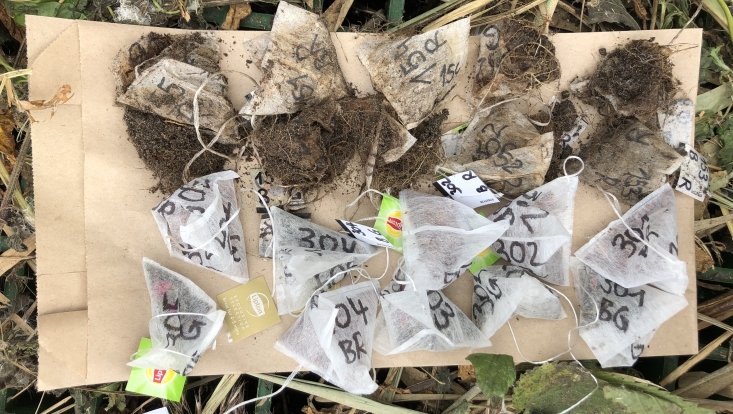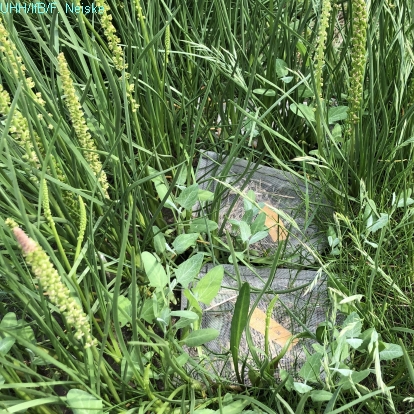Litter decomposition in marsh soils of the Elbe Estuary
3 March 2025, by F. Neiske

Photo: UHH/IfB/F. Neiske
Marsh soils have a high carbon storage potential, but this potential is influenced by climate change. In particular, marshes in estuaries are significantly affected by climate change, as rising sea levels and the intrusion of seawater into coastal regions can have substantial impacts on these ecosystems. These changes affect the carbon cycle by, for example, altering the decomposition of plant material. To better understand this decomposition process, we examined the decomposition of plant litter in the Elbe Estuary. We focused on the chemical composition of the plant material, the abiotic environmental conditions, and the bacterial community (prokaryotes) that are involved in the decomposition process. We investigated the decomposition of native plant material and tea (Tea Bag Index, Keuskamp et al., 2013) in marshes with different salinities (freshwater marsh, brackish marsh, salt marsh) and different flooding frequencies (daily, monthly, yearly).

Our results show that the quality of the plant material is an important factor for its decomposition. The decomposition of native plant material was strongly linked to its chemical composition; for example, a higher lignin content in the plant material of the vegetation in the freshwater marsh led to slower decomposition compared to the salt marsh. Similarly, decomposition decreased with higher flooding, while the lignin content increased. The effects of flooding varied depending on the quality of the plant material: the loss of recalcitrant material (rooibos tea) decreased with more frequent flooding, while the loss of labile material (green tea) increased. The bacteria associated with native plant material and tea exhibited different compositions and lower diversity than the local soil community, indicating that the plant material is selectively colonized by certain bacteria. The decomposition of tea material benefited from a diverse bacterial soil community, while the decomposition of native plant material was facilitated by an adapted local soil community.
Our results highlight how biotic factors (quality of the plant material, prokaryote community) and abiotic factors (salinity, flooding) control the decomposition of plant material in estuarine marshes. This suggests that the projected changes in salinity and flooding dynamics due to climate change could influence the decomposition dynamics in these areas and thereby affect carbon storage.
Neiske, F., Grüterich, L., Eschenbach, A., Wilson, M., Streit, W.R., Jensen, K., Becker, J.N. (2025). Litter decomposition and prokaryotic decomposer communities along estuarine gradients. In: Soil Biology and Biochemistry 204. 109762. https://doi.org/10.1016/j.soilbio.2025.109762.
More research on the Elbe Estuary: https://www.biologie.uni-hamburg.de/en/forschung/grk2530.html

